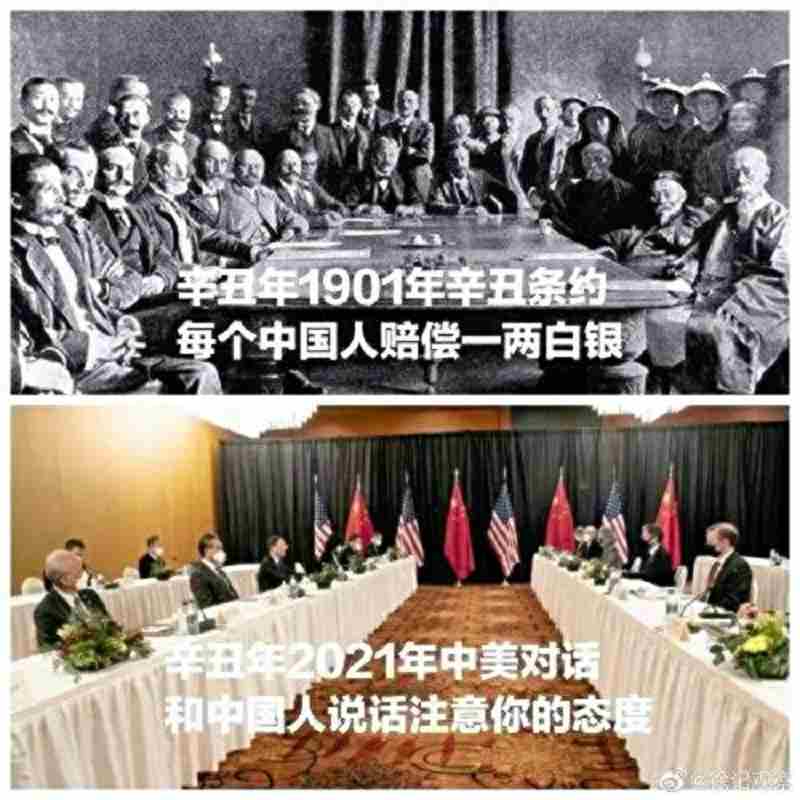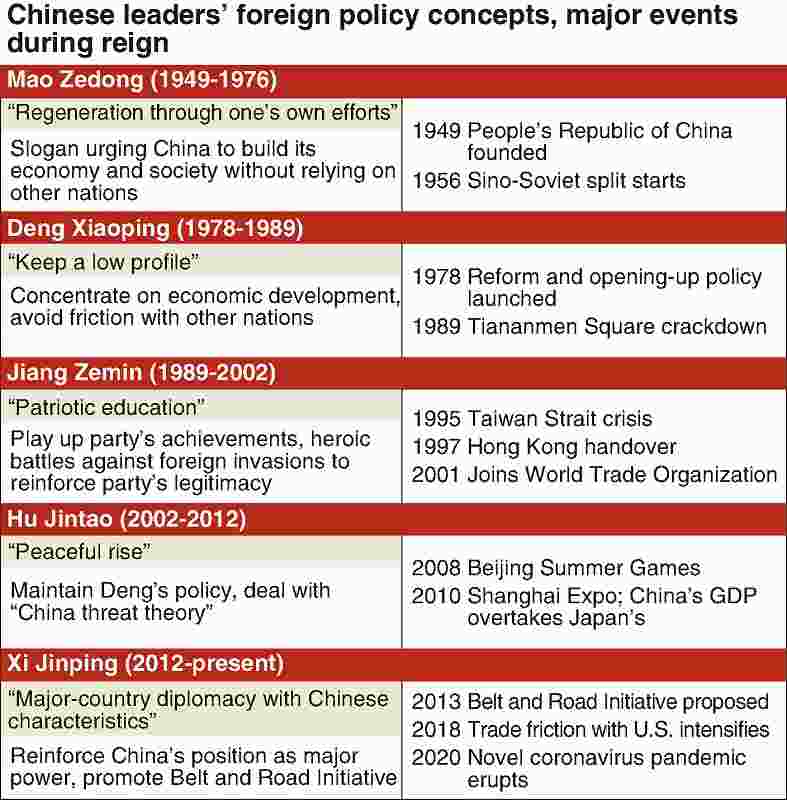
The June 30 editions of China’s English-language newspapers report on a ceremony held to coincide with the Chinese Communist Party’s centennial.
9:31 JST, July 10, 2021
This is the fifth and final installment of a series looking at the costs of the Chinese Communist Party’s struggle for supremacy in China and around the world.
The day before the Chinese Communist Party marked the 100th anniversary of its founding on July 1, the Chinese Embassy in Fiji posted a message in English on its official Twitter account:
“100 years ago, China didn’t have pulpits to safeguard its core interests on international occasions. Nowadays, China is actively contributing wisdom and strength to resolving global challenges and improving global governance.”
While Twitter is officially blocked in China, at least 270 Chinese diplomats stationed in 126 countries had Twitter and Facebook accounts as of May. This is according to an investigation by the Associated Press and the Oxford Internet Institute at the University of Oxford in England.
According to the investigation, 26,879 accounts that had retweeted posts by Chinese diplomats or Chinese state media from June 9, 2020, to Jan. 31, 2021, had been identified as fake. These fake accounts retweeted these types of posts almost 200,000 times before being suspended. It is possible a huge number of accounts were systematically set up and personnel mobilized to use them to spread China’s position and views to a worldwide audience.
Chinese President Xi Jinping, during a CCP meeting in May, instructed the propaganda department and other entities to work to create a “lovable” image of China.
A party source explained that this did not mean improving China’s image abroad. Rather, Xi wanted to seize the initiative in reshaping international opinion and create messages that “make people love China,” instead of China becoming “lovable.” This campaign also involves a “struggle” to decisively counter any criticism of Beijing.

A meme that appeared on Chinese social media compares a photo of the treaty negotiations held the year after the 1900 Boxer Rebellion with a photo of this year’s top-level U.S.-China diplomatic talks.
‘Times have changed’
Only 16.5% of people in the public and private sectors of the 10-member Association of Southeast Asian Nations (ASEAN) were “confident” or “very confident” that China would “do the right thing” in the wider interests of the global community, according to a survey report released in February by a research institute in Singapore.
Beijing’s handling of Hong Kong issues and its response to the novel coronavirus pandemic were among the matters creating an atmosphere in which a growing number of people are taking an increasingly harsh view of China.
Partly a response to rising nationalism accompanying China’s growing national power and influence on the global stage, China continues to flex its muscles through “wolf warrior diplomacy.” This abrasive diplomatic style, named after a hugely popular 2015 Chinese action movie, has become prominent since the pandemic erupted.
In March, senior Chinese diplomat Yang Jiechi held in-person talks with U.S. Secretary of State Antony Blinken in Alaska. Soon after the often ill-tempered meeting, a meme circulated on Chinese social media comparing a photo of the talks with a photo of the Boxer Protocol treaty negotiations, held the year after the 1900 Boxer Rebellion, one of the humiliating episodes in Chinese history that led to China’s semi-colonization by foreign powers.
“Times have changed,” said one message added to this meme, while another said, “Now, this is my great homeland.”
Yang, who had bluntly voiced his views to the U.S. side during the Alaska meeting, was increasingly being nicknamed “Tiger,” a term depicting him as a brave general and a nod to the fact that he was born in the year of the tiger in the Chinese zodiac.
China’s burgeoning military power, which is desperately trying to catch up to the U.S. military, also has aroused patriotism. This was epitomized by the June 7 sight of six Chinese naval ships massed in the Gulf of Aden off Somalia’s coast in East Africa for the handover of antipiracy missions.
Chinese military forces that were little more than guerilla units armed with rifles during World War II against Japan have steadily been enhanced. They now include aircraft carriers and cutting-edge intercontinental ballistic missiles. China’s military reach extends to the open seas about 8,000 kilometers from its own shores.

No turning back
Before Xi’s administration took power, China’s diplomatic policy had essentially been to keep a low profile and avoid friction with other nations so efforts could be concentrated on economic development. This approach now looks to be a thing of the past.
At a June 21 press conference in Beijing, Yan Xuetong, head of the Institute of International Studies at Tsinghua University — the university Xi attended — was asked by foreign media whether China might go back to that policy.
“That’s not possible,” Yan declared.
The fallout from disagreements with other nations, such as those triggered by China’s antagonistic hard-line remarks and its growing military footprint on man-made islands unilaterally being built in the South China Sea, is being felt even by diplomatic scholars within Beijing’s establishment who participate in international conferences. In the current atmosphere, dissenting views on the government’s main policies are said to be drowned out.
“Chinese nationalism has been pumped up so much that diplomatic options are quite constrained,” said Kwansei Gakuin University Prof. Ichirou Inoue, an expert on Chinese diplomatic relations.
As the CCP marks its centennial, discord is becoming apparent in this huge entity due to discontent within the country and disagreements with the international community. Danger lurks as China unflinchingly pushes ahead with a hard-line approach aimed at keeping the nation united around Xi’s administration.
Top Articles in World
-

Israeli Ambassador to Japan Speaks about Japan’s Role in the Reconstruction of Gaza
-

Videos Plagiarized, Reposted with False Subtitles Claiming ‘Ryukyu Belongs to China’; Anti-China False Information Also Posted in Japan
-

Nepal Bus Crash Kills 19 People, Injures 25 Including One Japanese National
-

Ukrainian Ambassador Closely Watching Japan’s Revision of Defense Export Rules, Hopes for Future Arms Support
-

China, India Tapping into Promising African Market; Beijing Announces Tariff Cuts, Both Countries Aim to Expand Exports
JN ACCESS RANKING
-

Producer Behind Pop Group XG Arrested for Cocaine Possession
-

Japan PM Takaichi’s Cabinet Resigns en Masse
-

Man Infected with Measles Reportedly Dined at Restaurant in Tokyo Station
-

Israeli Ambassador to Japan Speaks about Japan’s Role in the Reconstruction of Gaza
-

Videos Plagiarized, Reposted with False Subtitles Claiming ‘Ryukyu Belongs to China’; Anti-China False Information Also Posted in Japan

























